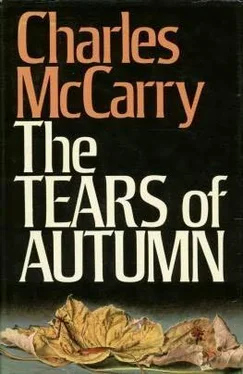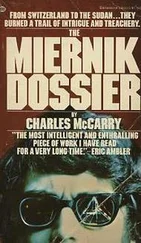Dimpel stripped off his climbing clothes and stuffed them in his rucksack. Thick blond hair grew on his chest and shoulders, and his skin, pink and healthy from many baths, shone with sweat. He went into the bathroom, and Christopher heard him clearing his throat and spitting, and then the rush of the shower.
When Dimpel came out again, his hair was slicked down and he had wrapped a towel around his waist. He put on his street clothes, brushing imaginary specks of dust from each garment, and tied his silk necktie with great attention to the size of the knot.
“There were five documents in the file you wanted,” he said. “A deposit slip, a memorandum of identity, an explanation of the withdrawal code, a withdrawal slip, and a police report. I took four photographs of each, as there was no brace for the camera and the light was not good. If the film was fast enough, you’ll have readable copies.”
“Thank you,” Christopher said. “That was very quick work.”
“It was simple work, and therefore very dirty.” Dimpel looked at his fingernails, took a gold penknife from his pocket, and began to clean them.
“The matter of payment,” Christopher said. “How do you want that arranged?”
“I have no need for money.” Dimpel closed his penknife and threw his head back with a snap. “Do you have German blood?” he asked.
“Half, from my mother.”
“I thought so. You look German. You have the manner, the confidence, of a German officer.”
Christopher had never been paid a compliment that he desired less. He made no reply. What Dimpel said next he said in his ordinary brisk tone of voice.
“Major Johnson may have told you about my early connection with Adolf Hitler.”
“Yes.”
“You’re hiding a smile. I see you know the entire story. No, don’t protest-I understand. I’ve thought much about that man. He was an obvious fool. Yet he was permitted to make history-destroy Germany. I mean its architecture, which was a work of art, and its name.”
Dimpel paused and watched Christopher’s face, as if awaiting a reaction to some startling bit of information.
“What I would like from you,” he said, “is something from your government’s collection of booty that belonged personally to Adolf Hitler.”
Christopher saw a glint of humor in the calm depths of Dimpel’s eyes. “Have you any particular item in mind?” he asked.
“Something that he wore or a personal document. Not so large that it will not fit into a good-sized picture frame.”
“You’re going to hang it on your wall?”
Dimpel was grinning now. “Yes, in a gold frame with a light shining on it. After I’ve used it to wipe my behind.”
Dimpel picked up his rucksack, set his cap on his head, shook hands firmly, and left.
Christopher started south again at first light, and he was in Rome by early evening. The city was loud with the rough music of the bagpipers.
What had been snow in Zurich was rain in Rome. Christopher turned into the slow traffic along the Lungotevere; the windows of his car were steamed and the wipers could barely keep the windshield clear of the sluicing rain. There were two Vietnamese in his street, one at either end of the block in which his apartment building stood. One of them had draped a sodden newspaper over his head. A third Vietnamese sat in a black Citroen with Paris plates, smoking a cigarette. The eyes of all three men were fixed on the entrance to Christopher’s apartment, and even if they had been able to see into his car they would not have recognized him driving by in the snarl of rush-hour traffic.
When Christopher showed Stavros Glavanis the room in which he would break Frankie Pigeon, the Greek ran his palm over its cold sweating walls and said, “If you’re going to do this to him, you may as well kill him.”
“You have to bring him here in perfect condition and get the information without putting a mark on him,” Christopher said.
“These methods are not your usual ones. Are you growing more realistic?”
“It’s a special case,” Christopher said. “This man can’t be moved by money, and he’s too afraid of his own people to talk, unless you make him more afraid of you.”
Glavanis looked around the bare circular room again. He shrugged. “It may be possible,” he said. “It depends on the man -it always depends on the man, and how quickly you get to know him.”
Glavanis had had trouble finding the second operative Christopher had asked for in his telegram, and more trouble getting out of Corsica during Christmas week, when the boats and planes were fully booked with foreigners on holiday. His standing instructions were to make contact on any even-numbered hour between six in the evening and midnight. Christopher had gone to the meeting place on the Capitoline Hill three times before Glavanis and his companion finally appeared.
By ten o’clock, Christopher was tired, and the wine he had drunk at dinner had given him a headache. At four minutes after the hour, he saw the tall figure of Glavanis, accompanied by a shorter man, climbing the steep street that led from the ruins of the Forum. Christopher, standing in the shadows, snapped his fingers twice and Glavanis came straight for the sound.
He embraced Christopher. “You remember Jan Eycken,” he said.
Christopher nodded and held out his hand. Eycken hesitated for a fraction of a second. He did not like to display his hands: he had lost both thumbs when he fell into the hands of an Algerian rebel unit in the Kabylia, and he had spent his life among simple men who hated deformity.
Glavanis and Eycken had been comrades in the Foreign Legion-Glavanis a sergeant-major, Eycken one of his corporals. Glavanis was amused by Eycken’s stolid Flemish self-absorption. Eycken had been a younger child than Glavanis during the Second World War, and he had seen action only in colonial wars. He thought Glavanis looked down on him because he had never killed a white man. Glavanis, wiping mirth from his eyes, had told Christopher that he planted this notion in Eycken’s mind because it made Eycken very brave when they went into action together.
Stavros Glavanis came from a Macedonian village on the Greek side of the frontier with Yugoslavia, and he had been killing men in battle since the age of thirteen. His father had been a follower of General Napoleon Zervas, and when he went with Zervas’s EDES partisans in 1941, he took Stavros, his oldest son, with him. They remained in the field, ambushing Germans and later fighting Greek Communists in the mountains, until the end of the Greek civil war in 1949.
When they returned to their village, they found that Stav-ros’s mother was dead, and his six brothers and sisters, and most of his cousins, had been taken across the frontier and on to Russia by the Communists, to be trained for some future Greek revolution. Stavros’s father gave him his gold ring and told him to marry and breed new children. Then, carrying his British rifle, he set off through the woods to the east. Stavros never saw him again.
Stavros married an Athenian girl, and found that he had married her too quickly: she cuckolded him within the year with an old lover who had fought against Stavros as a member of the Communist ELAS partisans. Stavros killed his wife’s lover, shipped on a freighter to Marseilles, and joined the Foreign Legion. Christopher met him in Indochina, where he was a sergeant leading a platoon composed mostly of Germans. Because of Stavros’s long experience as a guerrilla fighter and his personal enthusiasm for killing Communists, his platoon was one of the most successful units operating in the Indochina War on the French side.
Читать дальше












